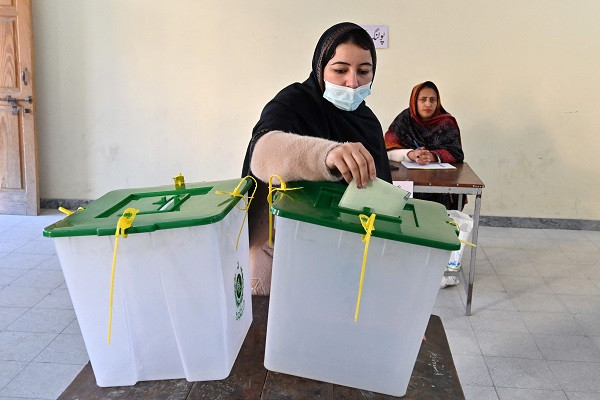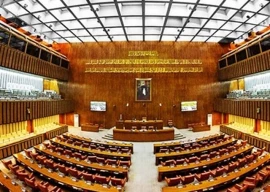
The Election Commission of Pakistan (ECP) on Sunday concluded the gigantic election exercise, with the announcement of the results after counting all the votes cast on Thursday during the polling, issuing the preliminary position of the political parties in the national and provincial assemblies.
Voting was held on 854 national and provincial assembly constituencies. According to the initial results, 348 independents returned successful. Barring a few, the independents belong to the Pakistan Tehreek-e-Insaf (PTI) which was denied its electoral symbol of ‘bat’ due to its controversial intra-party elections.
Among the political parties, the Pakistan Muslim League-Nawaz (PML-N) emerged as the largest party, winning 227 seats, followed by the Pakistan Peoples Party (PPP) with 160 seats. The Muttahida Qaumi Movement-Pakistan (MQM-P) is in third place with 45 seats.
In the National Assembly, independents won 101 seats, according to the preliminary results. The PML-N got 75 seats, while the PPP grabbed 54 and the MQM-P secured 17 seats. Among other parties, the Jamiat Ulema-e-Islam (JUI) won four seats, PML-Quaid, three, and Istehkam-e-Pakistan Party (IPP) and the Balochistan National Party (BNP), two each.
Besides one seat each is shared by Majlis Wahdat-e-Muslimeen Pakistan (MWM), Pashtoonkhwa National Awami Party (PNAP), Balochistan Awami Party (BAP), Pashtunkhwa Milli Awami Party (PkMAP), National Party (NP) and PML-Zia.
In the provinces, the independents lead in Punjab and Khyber-Pakhtunkhwa, winning 90 and 138 seats, respectively. The PPP in Sindh and Balochistan, won 84 seats in the Sindh Assembly, while it shared top position in Balochistan Assembly with the JUI, having 11 seats each.
The election, which was itself much delayed, comes at a pivotal moment.
Pakistan is in an economic crisis, with dwindling foreign currency reserves that will be further strained by a $1 billion bond payment due in two months, while its $3 billion funding programme with the International Monetary Fund expires on April 12.
"Pakistan will be entering into more severe political and economic instability if no party emerges with a simple majority," Sajid Amin of the Sustainable Development Policy Institute, a former adviser to the Ministry of Finance, said.
"But most important is the credibility of elections and legitimacy of the government - any government which lacks credibility will not be able to deliver on much-needed reforms."
Securing funding will be a top priority, with the country having not yet fully covered its external financing requirements for 2024 and its nearly $100 billion external debt burden.
A new government is expected to quickly take the necessary steps for example on governance of state-owned enterprises to complete the last remaining review of the current $3 billion IMF Stand-by Arrangement - a bridge loan that helped pull the country back from the brink of default.
Doing so would secure it a final $1.1 billion tranche before the current IMF programme expires in mid-April - with the government then having to secure a follow-up programme straightaway.
(With input from Reuters)



-(14)1720679028-0/(image-blakelively-on-Instagram)-(14)1720679028-0-165x106.webp)

1731028448-0/Untitled-design-(37)1731028448-0-165x106.webp)












COMMENTS
Comments are moderated and generally will be posted if they are on-topic and not abusive.
For more information, please see our Comments FAQ